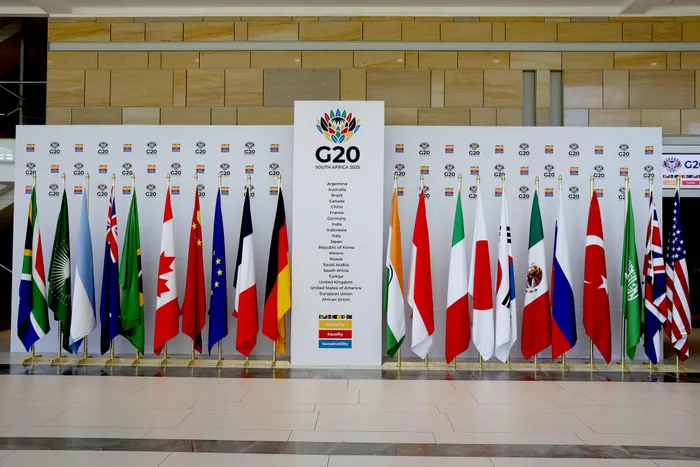Exploring the G20 Summit: South Africa's role and challenges for the Global South

Johannesburg prepares to host the G20 Leaders' Summit at Nasrec.
Image: Supplied
South Africa, like all developing countries, should use its membership of the G20 to untangle itself from the chains of imperialism so that it can enjoy economic emancipation, said the South African Communist Party (SACP).
Through its national spokesperson, Mbulelo Mandlana, the SACP said South Africa’s participation in the G20 was a positive sign for the poorer nations.
African countries are represented by the African Union in the G20, which has 19 countries that are independently represented.
As the G20 president, President Cyril Ramaphosa has been seen as the representative of the Global South, which is made up of emerging nations in Asia, Africa, and Latin America.
Mandlana said South Africa’s participation was a positive reflection of its international relations policy.
“From a country that used to be a pariah to a country that is playing a leading role in international affairs, this is a positive event,” said Mandlana.
He said the country had proven to be a major international role player, including its members of the BRICS.
However, Mandlana noted that the world was still dominated by the West and the Global North, which limits South Africa's ability to determine its economic policy.
“We continue to have great indebtedness as the African continent to the IMF (International Monetary Fund) and the World Bank, as South Africa has recently taken some new loans, creating a further burden on our national fiscus.
“This event (G20 summit) takes place in South Africa, where the policy of neoliberalism has created a great burden on the working class and continues to bear a terrible status of a country that is leading in inequality.
“While this thing (hosting G20) is positive, the working class continues to be under the boot of imperialism and the great force of the bourgeoisie, which requires us to untangle ourselves from these institutions of global capture,” he said.
International Relations and Cooperation Minister Ronald Lamola’s spokesperson, Chrispin Phiri, said the African continent, which holds around 30% of the world’s mineral reserves, including over 60% of global cobalt reserves and 40% of manganese, champions the G20 Africa Cooperation Agenda on Trade and Investment.
“These resources are indispensable to the green transition. Harnessed responsibly, these minerals can underpin Africa’s sustainable industrialisation and integration into global supply chains.
“South Africa’s focus will be on cooperation, beneficiation, and ensuring that Africa captures greater value from its own wealth,” he said.
He said the G20 supports the African economic project as its primary focus in mobilising investment into Africa's productive sector and key infrastructure projects, directly strengthening the implementation of the African Continental Free Trade Area.
“Furthermore, the inaugural Global SME Ministerial Meeting was co-hosted by South Africa, putting small businesses — the backbone of African job creation — at the heart of the global trade agenda,” said Phiri.
However, Public Service and Commercial Union of South Africa (PSCU) Secretary General Tahir Maepa labelled the G20 as a platform where powerful nations listen politely to the plight of their poorer counterparts but do nothing to give them equal economic opportunities.
Maepa, a founder of the Resistance Against Impunity Movement (RAIM), described the G20, established in 1999 in response to the Asian financial crisis, as a body that encourages global inequality.
Maepa said that despite suffering the most through austerity measures, retrenchments, and wage freezes during the economic meltdown, the working class has never been invited to participate in the G20.
“So while the G20 represents 85% of global GDP and two-thirds of the world’s population, its decisions are still largely shaped by the same forces that benefit from global inequality.”
He said that, contrary to South Africa’s participation being framed as a victory for the Global South, the G20 was failing to close the economic gap between the developed and developing nations.
“Our presidency theme of 'Solidarity, Equality, and Sustainability’ offers a moral compass, yet it remains to be seen whether those ideals can survive the heavy hand of Western interests.
“When South Africa speaks about debt relief for poorer nations, fair access to climate finance, or equitable trade in critical minerals, the G20 listens politely but seldom acts decisively,” said Maepa.
South Africa is hosting the summit, with Ramaphosa being the president of the G20.
Maepa accused the United States, whose President Donald Trump will not come or send a representative to South Africa to accept the G20 presidency from Ramaphosa, of weaponising finance, trade, and diplomacy to protect its corporate interests.
Ramaphosa has accepted that he would hand over the G20 presidency to “an empty chair”.
“Their (United States) rhetoric about 'rules-based order' hides a legacy of intervention, economic blackmail, and manipulation, the very practices that keep the Global South from developing,” he said.
Maepa said South Africa’s role in the G20 must not be dismissed, but neither should it be romanticised.
“We are in an arena where power is uneven, and where the Global South must constantly fight to be heard. Our task is to use this platform not as a dining table, but as a battleground to speak truth to power, to resist tokenism, and to fight for systemic reform that ends the cycles of debt and dependency.”
bongani.hans@inl.co.za
Related Topics: